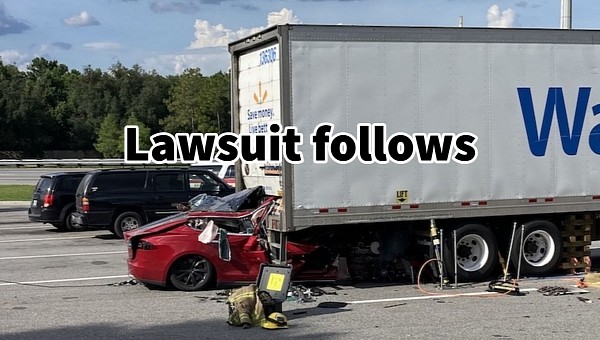The family of a California couple killed in a crash in Florida last year has named Tesla in a wrongful death lawsuit. Mary Lou and Karl Seelandt died when their Tesla Model S hit the back of a tractor-trailer at a Florida highway rest stop.
On July 6, 2022, a strange but deadly crash happened on I-75 at the Paynes Prairie Rest Area. A Tesla Model S exited the interstate and veered toward the truck lot, plowing into the back of a parked Walmart truck. To get there, the car had to make an S, driving to the right to enter the rest area and then left to enter the truck parking zone, where it hit the truck. The impact was so powerful that the Model S entered underneath the trailer until its B-pillar. There was no escape for the 66-year-old woman behind the wheel and her 67-year-old husband.
The NHTSA sent an investigative team to the crash site, which made people believe they suspected the Autopilot was involved. The investigation had been trailing for more than 6 months before the Florida Highway Patrol confirmed in February that the deadly crash was caused by human error. According to the investigation, the car did not have Autopilot equipped, and the car data showed that the driver hit the gas pedal rather than the brake. The Model S entered the rest stop at 60 mph (96 kph), hit a curb, and then the trailer. There were no signs of braking before the Tesla hit the trailer.
Even before the investigation concluded, the family of the California couple considered suing Tesla. They waited for the investigation results and decided to move on with the lawsuit. According to the case, the family claims the car was “defective,” and it had “malfunctioned” while Mary Lou Seelandt was driving it “as intended and designed.” The suit doesn’t specify the alleged defect or malfunction. It does mention that the car was equipped with crash avoidance and mitigation features that should’ve prevented the crash from happening, but they didn’t.
This happens when the driver overrides the system by pressing the accelerator pedal. The Seelandts had been on a long road trip that included visiting their granddaughter in Georgia, according to Mercury News. It’s possible they were tired at the time of the crash, which caused the driver to inadvertently press the accelerator instead of the brakes when entering the rest area.
This is one of the few crashes where Autopilot use has been ruled out. Earlier this month, the investigators concluded that the Autopilot wasn’t activated in a deadly crash in Newport Beach on May 12, 2022. The accident was one of the 34 involving self-driving tech investigated by the NHTSA since 2016, with 28 involving a Tesla vehicle.
The NHTSA sent an investigative team to the crash site, which made people believe they suspected the Autopilot was involved. The investigation had been trailing for more than 6 months before the Florida Highway Patrol confirmed in February that the deadly crash was caused by human error. According to the investigation, the car did not have Autopilot equipped, and the car data showed that the driver hit the gas pedal rather than the brake. The Model S entered the rest stop at 60 mph (96 kph), hit a curb, and then the trailer. There were no signs of braking before the Tesla hit the trailer.
Even before the investigation concluded, the family of the California couple considered suing Tesla. They waited for the investigation results and decided to move on with the lawsuit. According to the case, the family claims the car was “defective,” and it had “malfunctioned” while Mary Lou Seelandt was driving it “as intended and designed.” The suit doesn’t specify the alleged defect or malfunction. It does mention that the car was equipped with crash avoidance and mitigation features that should’ve prevented the crash from happening, but they didn’t.
This happens when the driver overrides the system by pressing the accelerator pedal. The Seelandts had been on a long road trip that included visiting their granddaughter in Georgia, according to Mercury News. It’s possible they were tired at the time of the crash, which caused the driver to inadvertently press the accelerator instead of the brakes when entering the rest area.
This is one of the few crashes where Autopilot use has been ruled out. Earlier this month, the investigators concluded that the Autopilot wasn’t activated in a deadly crash in Newport Beach on May 12, 2022. The accident was one of the 34 involving self-driving tech investigated by the NHTSA since 2016, with 28 involving a Tesla vehicle.












